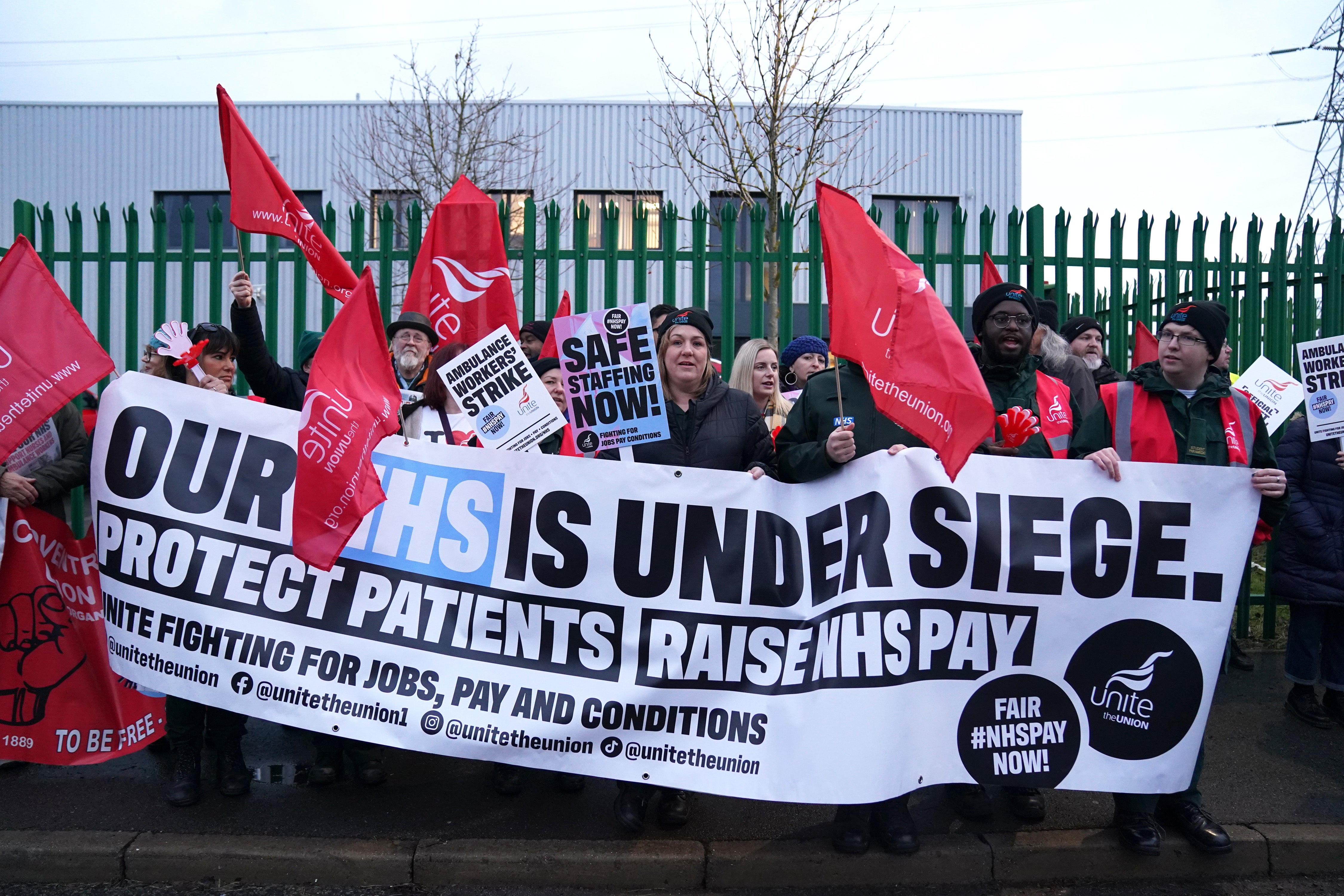Inside Politics: 999
Ambulance workers take strike action in row over pay and conditions and Priti Patel criticised over Rwanda Christmas card, writes Matt Mathers


Hello there, I’m Matt Mathers and welcome to The Independent’s Inside Politics newsletter.
Some festive cheer this Wednesday morning: today is the winter solstice, which means the days get longer and the nights become shorter from tomorrow.
Inside the bubble
Parliament returns on 9 January.
Steve Barclay, the health secretary, is on BBC Radio 4 Today right about now.
Daily briefing
What is your emergency?
Ministers are urging Britons to avoid risky activities and to go easy on the booze at Christmas parties tonight as thousands of ambulance workers go on strike in yet another row over pay and conditions amid the growing winter of discontent. Today’s industrial action affects all ambulance trusts in England – apart from East of England and the Isle of Wight – and all those in Wales, with each of the unions involved walking out at slightly different times.
Some 25,000 staff will walk out across the country, with the Unison action running from noon until midnight. The GMB action ran from midnight last night to midnight tonight, and Unite’s from midnight Tuesday to midday today. Officials said they expected that all category 1 calls – the most life-threatening such as cardiac arrest – will still be responded to along with the most serious category 2 calls, which covers serious conditions, such as stroke or chest pain.
Eight out of 10 ambulance trusts have already declared critical incidents and health bosses have warned that they cannot guarantee patient safety, with around 600 armed forces personnel being deployed to cover for striking ambulance staff, providing support for paramedics, although their role will be strictly limited.
The strike action goes ahead after unions and the government failed to reach an agreement on pay. Ambulance staff have been offered a 4 per cent pay rise – amounting to an additional £1,400 per head. But they have rejected it and are asking for a rise closer to inflation, currently running at 10.7 per cent. The government has said those demands are unreasonable and unaffordable.
Christina McAnea, the Unison general secretary, said that if there were any deaths during the strike it would “absolutely” be the fault of the government. Steve Barclay, the health secretary, claimed that unions made a “conscious decision” to “inflict harm” on patients.
Meanwhile, a fresh poll by YouGov shows NHS nurses and ambulance staff have the highest levels of support among the public out of all the public sectors taking industrial action. Rail workers have the least support. Two-thirds of the British public (66 per cent) say they support the nurses’ strike, with 45 per cent of people saying they “strongly” support it. Some 63 per cent say they back ambulance workers.

Enjoying this newsletter?
Unlock unlimited, ad-free reading on the website and in The Independent app when you subscribe – plus, benefit from our welcome offer when you join today.
Rwanda row
Is Priti Patel trying to outdo her controversial replacement as home secretary in the shock stakes?
The former Home Office boss was last night accused of lacking “basic human decency” after sending out a Christmas card showing her as a fairy magicking up deportations to Rwanda.
It comes after judges at the High Court in London ruled that the policy was lawful.
Suella Braverman, the new home secretary, once told a newspaper event at the Tory Party conference that it was her “dream” to see the flights start taking off.
Merry Christmas.
Today’s cartoon
See all of The Independent’s daily cartoons here

On the record
Christina McAnea, Unison general secretary, claims any deaths during strike action will be the fault of government.
“They have been totally irresponsible. It’s completely irresponsible of them to refuse to open any kind of discussions or negotiations with us.”
From the Twitterati
Beth Rigby, Sky News politics editor, on strikes.
“Barclay tries to lay blame on unions. Unions try to lay the blame on govt for refusing to negotiate on pay. Meanwhile, a YouGov polls shows 2/3 of public support nurses over strikes. & in midst of the stalemate, the public suffer the risk. If no negotiations, more strikes to come.”
Essential reading
- Sean O’Grady, The Independent: Why Sadiq Khan faces a tough fight in London even as Labour surges ahead
- John Rentoul, The Independent: What I got wrong in 2022: How badly Conservative Party members wanted to believe in fairytales
- Clare Seal, The Independent: Don’t succumb to ‘giftflation’ – there are better ways to show love this Christmas
- Hamish McRae, The Independent: What will happen to China and the West in the future? We have the first forecasts
Inside Politics first appeared in our daily morning email. You can sign up via this link.






Join our commenting forum
Join thought-provoking conversations, follow other Independent readers and see their replies
Comments